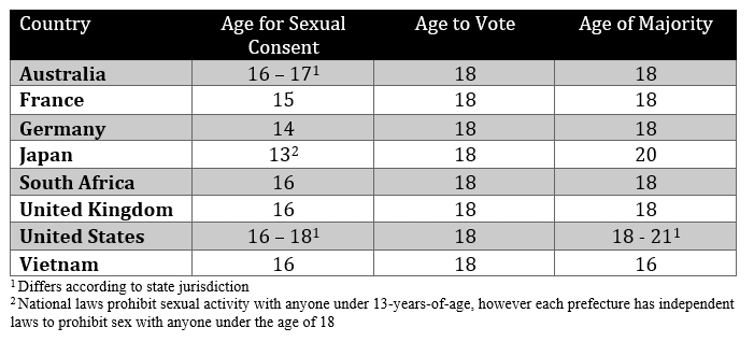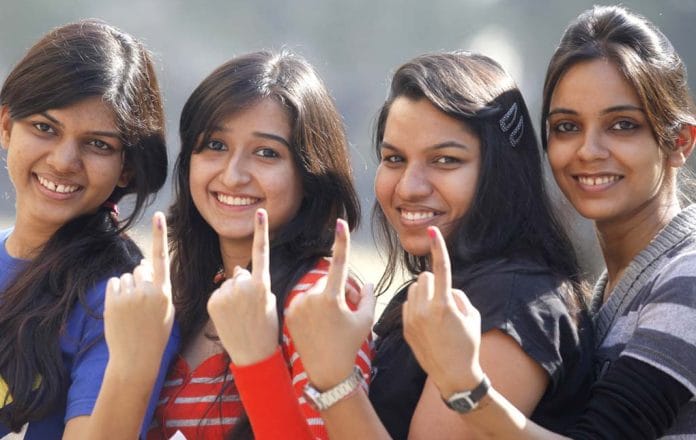If a more dynamic definition of adulthood is adopted, then the next question is, at what age is it reasonable to assign social responsibility to young people?
Around the world, the idea of adulthood – when it happens and how it is defined – is being challenged.
In Australia, the Greens’ Jordon Steele-John introduced a bill to give 16- and 17-year-olds the right to vote; Malaysian minister Syed Saddiq Abdul Rahman announced the country may lower the voting age to 18 before the next elections; and Japan recently lowered its voting age from 20 to 18 for referendums, following the 2016 decision to lower the voting age in general elections.
Japan’s decision was in part to address voter apathy and help young people feel more engaged in politics. But it may also signal that social views regarding the commencement of adulthood have shifted.
The shifting definitions of adulthood
Adulthood has traditionally been defined by a combination of age and the achievement of social milestones. Most countries have a legally defined age to determine when a person is considered an adult – the age of majority.
In Australia, most states consider a person to be an adult in court at 18. The age of 18 is also consistent with other adult privileges, such as the right to purchase alcohol and to marry.
However, 17-year-olds can enlist for military service and obtain a driver’s licence, whilst 16-year-olds can give sexual consent (in most states). The law confers adulthood on the basis of age, but also recognises the process of becoming an adult as involving gradual increases in social responsibility.
This legally defined approach to adulthood is mirrored in other countries, where there are differences between the age of majority and social responsibilities granted to young people.

Socially, determinants of adulthood traditionally focus on a person taking increasing responsibility for their lives in various ways. Completing school, commencing full-time employment, getting married and parenthood – these are all observable indicators used to determine when a person is viewed as adult (Zacares, Serra, & Torres, 2015).

Since the 1980s, however, some of these observable milestones are being achieved at later ages. Increased access to tertiary education has delayed young people leaving home and developing romantic relationships. The increased acceptance of de facto relationships has also reduced the need to leave home and marry in some Western cultures.
Economic changes have also resulted in unstable employment markets and increases in costs of living in some countries, prompting many young people to remain at home and dependent on parents.
In 2017, the Household, Income and Labour Dynamics in Australia report indicated that home ownership among 18-to-39-year-olds has declined from 36% to 25% since 2001. Among young people aged 22 to 25, meanwhile, 60% of males and 48% of females were found to still be living with their parents in 2015, up from 43% and 27% respectively since 2001.
Due to these social changes, our expectations of young people and their level of social responsibility has also changed.
Psychological perspectives: an emerging adulthood
Psychologically, age alone is an unreliable determinant of adulthood, as each individual varies in their rate of biological, cognitive and emotional development.
The recognition of a new life stage – emerging adulthood – has been recommended by developmental psychologists to account for the changes to social milestones that have traditionally represented adulthood. The concept of “emerging adulthood” acknowledges the varied levels of independence exhibited by young people and reflects the process of personal development and “finding oneself”.

A subjective definition of adulthood is linked with positive-identity formation and well-being. Young people who perceive themselves to be adults are closer to reaching adult benchmarks, exhibit fewer signs of depression and hold a robust sense of self.
What should society expect of adults?
If a more dynamic definition of adulthood is adopted, at what age is it reasonable to assign social responsibility to young people?
Young people in high-arousal situations are at risk of making impulsive decisions up until their mid-20s. However, during times of low-emotional arousal, the reasoning abilities of young people are equivalent to adults.
The psychological evidence suggests the current approach in law of gradually increasing social responsibility for young people is prudent and accurately reflects the transitional nature of development to adulthood.
Increasing social responsibility among emerging adults, via civic engagement, has also been linked with their improved well-being. Civic engagement refers to involvement in one’s community and social and political systems. Therefore, Japan’s decision to lower its voting age is an example of law reflecting the contemporary emerging nature of adulthood.
Dr James McCue is a lecturer, researcher, and higher degrees supervisor in criminology and Psychology at Edith Cowan University in Western Australia.
This article was originally published on The Conversation. Read the original article.






